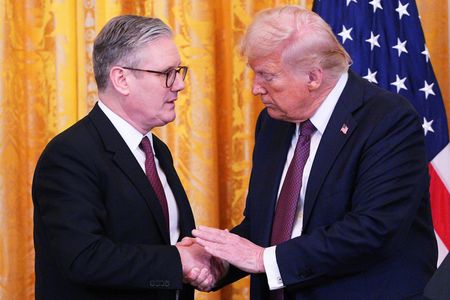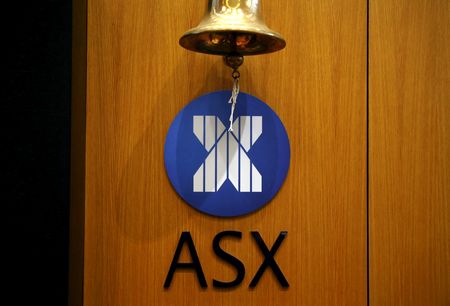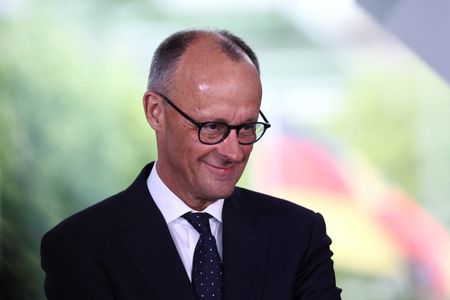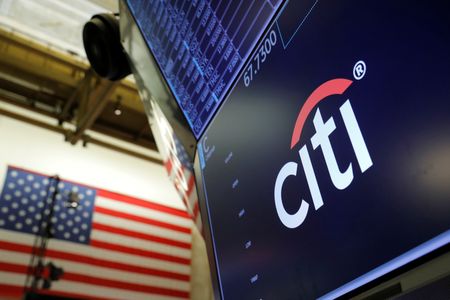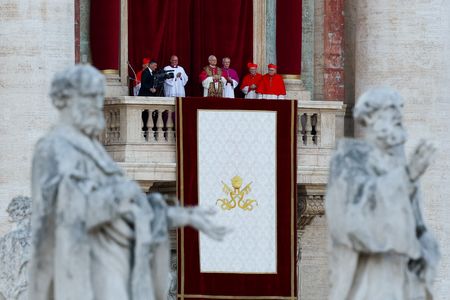LONDON (Reuters) – U.S. President Donald Trump and British Prime Minister Keir Starmer on Thursday announced a “breakthrough deal” on trade.
The deal leaves in place a 10% U.S. tariff on goods imported from the UK, while Britain agreed to lower its duties to 1.8% from 5.1% and provide greater access to U.S. goods.
Britain’s car industry will see U.S. tariffs immediately slashed to 10% from 27.5%, while levies on steel and aluminium will fall to zero.
London’s FTSE-100 stock index closed 0.3% lower, and the domestically-focused FTSE 250 index rose 0.6%. Sterling was steady around $1.3292.
COMMENTS:
LINDSAY JAMES, INVESTMENT STRATEGIST, QUILTER, LONDON
“The contents of the deal remain very limited in their totality and we await the full detail before we can say if there is a winner from this negotiation. However, for the UK this deal appears to be ultimately favourable for some of its largest exports, specifically cars, auto parts and aerospace engines to name some of the key areas. It is no surprise, therefore, that share prices of the likes of Rolls Royce and Melrose have risen sharply due to the news tariffs have been reduced, or in some cases eliminated.”
“Overall, while we await the details it is clear the UK is in a better trade position with the US compared to yesterday, but things remain much worse than six months ago. This deal is an encouraging start in what is now expected to be a longer-term process to move to a more wide-ranging deal.”
DARIO PERKINS, MANAGING DIRECTOR OF GLOBAL MACRO, TS LOMBARD, LONDON:
“The basic point is that the 10% universal tariff is still there… So we’ll end up with higher tariffs than we had before, but not the sort of crazy tariffs that were threatened.
I think they’re (future trade deals) are all going to be sort of token deals, they’re going to be more symbolism than actual substance.
The point is that they (the U.S. administration) clearly overplayed their hand. They don’t want markets to react away that they did in that week or so after Liberation Day. So it’s just about coming up with excuses to prevent those sorts of dynamics from happening again.”
SHARON GRAHAM, GENERAL SECRETARY, UNITE, UK:
“Workers will be relieved as today’s agreement provides some respite on U.S. tariffs and lessens immediate threats to jobs.”
“However, the government would be wrong to think this marks a long-term solution to the challenges facing UK industry. The tariff issue has starkly revealed the world is becoming increasingly unpredictable and measures must be in place to properly protect UK industry. Our industries need to be actively backed not left hanging in the wind.”
JOHN DENTON, SECRETARY GENERAL, INTERNATIONAL CHAMBER OF COMMERCE, UK:
“Today’s agreement is a welcome signal that the U.S. administration is serious about engaging with its trade partners and striking new deals.”
“While the deal offers some strategically important relief for British manufacturers, the reality is that U.S. tariffs on UK exports remain significantly higher than they were at the start of the year. It also remains unclear how this agreement will sit alongside any future sector-specific tariffs — in areas such as pharmaceuticals — which risks clouding long-term confidence in transatlantic trade relations.”
GEOFF YU, SENIOR MACRO STRATEGIST, BNY, LONDON:
“The main point from the U.S. point of view is that there is one deal on the table. The big one is going to be the one with China.”
“For the UK, there are two important things, (British Prime Minister Keir) Starmer has said the pharma sector has been protected. This is important, because there are high value jobs in the sector.
“Second, on cars, the news is a win. This helps protect the UK auto industry. Another positive is that they will work towards a digital services agreement.
“I am not sure if the Hollywood tax has been addressed yet. In the short-term it removes some uncertainty for the UK economy.”
PETER CARDILLO, CHIEF MARKET ECONOMIST, SPARTAN CAPITAL SECURITIES, NEW YORK
“This is what the market has been looking for… some sort of a breakthrough. Now, of course does this put to rest of the uncertainties regarding the trade war effects? No, but it’s a start.”
“This weekend they’ll be talking to China and that’ll probably take time, but I suspect that the next deals could emanate from either Japan or India.”
MICHAEL BROWN, SENIOR RESEARCH STRATEGIST PEPPERSTONE, LONDON:
“The detail is clearly very, very thin on the ground indeed and hopefully, at some point we get some information on that. The biggest takeaway from all of this for me is the 10% baseline tariff is still place no matter what they’ve agreed.”
“Trump has been saying the UK is a great friend of the United States. The fact that the U.S. runs a big trade surplus with the UK, if we still end up with a 10% tariff on the back of a trade deal, I would wager that it’s going to be a hell of a lot higher for places like the European Union or China or Japan or wherever else who are looking to strike deals.”
“The obvious headline is: there is a deal, it is possible to get something out of the United States. Is it a blueprint everyone else can follow? Probably not, given the structure of it. Is it a sort of silver bullet that’s going to solve everyone’s problems? Probably not. Because if we do use this as some sort of framework, then tariffs are still going to remain in place, whether you’ve got a deal or not.”
BRIAN JACOBSEN, CHIEF ECONOMIST, ANNEX WEALTH MANAGEMENT, MENOMONEE FALLS, WISCONSIN:
“The biggest lesson is that 10% is the minimum tariff. A deal with the UK was low hanging fruit considering the US runs a trade surplus with the UK. It’s not a template for other trade deals.
“I think the language around Xi and China helped turn things around. It’s not just a meeting to meet, it’s a substantive meeting. That could speed things along.”
(Reporting by the Reuters Markets Team; Compiled by Dhara Ranasinghe; Editing by Amanda Cooper)

